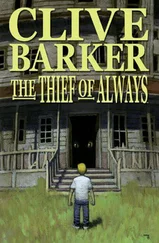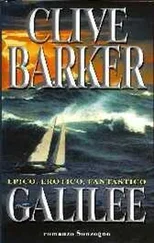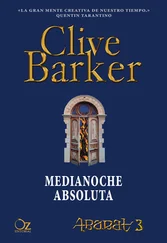Clive Barker - Sacrament
Здесь есть возможность читать онлайн «Clive Barker - Sacrament» — ознакомительный отрывок электронной книги совершенно бесплатно, а после прочтения отрывка купить полную версию. В некоторых случаях можно слушать аудио, скачать через торрент в формате fb2 и присутствует краткое содержание. Жанр: Фантастика и фэнтези, на английском языке. Описание произведения, (предисловие) а так же отзывы посетителей доступны на портале библиотеки ЛибКат.
- Название:Sacrament
- Автор:
- Жанр:
- Год:неизвестен
- ISBN:нет данных
- Рейтинг книги:5 / 5. Голосов: 1
-
Избранное:Добавить в избранное
- Отзывы:
-
Ваша оценка:
- 100
- 1
- 2
- 3
- 4
- 5
Sacrament: краткое содержание, описание и аннотация
Предлагаем к чтению аннотацию, описание, краткое содержание или предисловие (зависит от того, что написал сам автор книги «Sacrament»). Если вы не нашли необходимую информацию о книге — напишите в комментариях, мы постараемся отыскать её.
Sacrament — читать онлайн ознакомительный отрывок
Ниже представлен текст книги, разбитый по страницам. Система сохранения места последней прочитанной страницы, позволяет с удобством читать онлайн бесплатно книгу «Sacrament», без необходимости каждый раз заново искать на чём Вы остановились. Поставьте закладку, и сможете в любой момент перейти на страницу, на которой закончили чтение.
Интервал:
Закладка:
CHAPTER IX
It had entertained Jacob mightily to go amongst the stoic fishermen of Oban as though the harbour were the shores of Galilee, and he looking for disciples. He found one after a little search; a man in his late sixties by the name of Hugh who had been pleased to take a passenger over to Tiree for a modest sum. The fee was quickly agreed upon and they left a little after eight-fifteen, following the route of The Claymore up the Sound. The ship was of course a great deal more powerful than Hugh's little boat, but unlike The Claymore they did not have any ports of call to delay them along the way, so that they came into ,the little harbour at Scarinish no more than two hours after the ferry.
The voyage had refreshed and replenished Jacob. He had not slept, but he had fallen into a meditative mood as he watched the sea. He had never understood why it was so often thought to be a feminine element. Yes, there were tides in a woman's body that were not to be found in a man; and yes, it was the place of genesis. But it was also ambitious and dispassionate; slow in its workings against the land, but inevitable. Surely then it was the earth that was woman's lot; the nurturing place, warm and fertile. The deeps belonged to men.
So he mused, as they sailed. And by the time he stepped off the boat onto the pier his mind was pleasantly lulled, as though he had just finished writing in his journal, and was ready to turn a fresh page.
He decided against stealing a vehicle to finish his journey. The island was small, and though he doubted it was well policed, this was not the time to risk being delayed by an officer of the law. He went into the post office and asked the affable girl behind the counter if maybe she knew of a taxi service. The girl said that indeed she did; the island's only taxi was owned and driven by her brother-in-law Angus, and she would be happy to phone him. She did so, and told Jacob the car would be outside within a quarter of an hour. It took rather longer than that, but finally the aforementioned Angus drove up in his twenty-yearold Volkswagen, and asked Steep where he wanted to go.
'Kenavara,' Jacob told him.
'Now d'you mean Barrapol?'
'No. I mean the cliffs,' Jacob said.
'Well, I can't drop you there,' Angus replied. 'There's no road.'
'Just get me as close as you can.'
'That'll be Barrapol,' Angus said.
'That's fine. Barrapol's fine.'
What would have happened to him, he wondered as they drove, if he'd never left the islands? Never taken a human name, never pretended to be something other than he was and in that process mislaid the truth of his nature; gone to live instead far from enquiring eyes, on Uist or Harris or a piece of sea-girdled rock that was, like him, nameless? Would he have found the silence he needed; and found God in it? He doubted it. Even here, in this spartan place, there was too much life, too much distraction. Sooner or later, the passion for absence that had driven him would have risen into his thoughts.
His driver was, of course, chatty. Where had Jacob come from, he wanted to know, and where was he staying? Did he know Archie Anderson, of Barrapol? Jacob answered the questions as best he could, all the while thinking about God and namelessness, as though he were two people. One, the human being he'd been playing for so long, the man making small-talk with the driver; the other the being who moved behind that pretence. The being who had left this island with murder on his mind. The being who was going home. It was in sight now, that home. The long headland of Ceann a' Bharra, where Rukenau had laid the foundations of his empire. Despite the conversation they'd had as they left Scarinish, Angus wanted to know if he couldn't drop his passenger off at some particular house. He knew everyone in Barrapol, he said (it wasn't difficult; there were less than a dozen houses); lain Findlay and his wife Jean, the McKinnons, Hector Cameron.
'Just take me to the end of the road,' Jacob said, 'and I'll make my own way from there.'
'Are you sure now?'
'I'm sure.'
'Well, you're the man who's payin'.'
Where the road withered to a track, Jacob got out and paid Angus twice what he'd charged. Very happy with this minor windfall, Angus thanked him, and offered a card with his number in case Jacob needed a taxi for the return journey. He was so plainly proud to have a card with his name printed on it (he'd had them made up in Oban, he said) that Jacob accepted it graciously and, thanking him, began the trek through the machair to Kenavara. The look of unalloyed pleasure on the man's face when he'd produced the card remained in Steep's mind long after the car had disappeared and left him amongst the leaping hares. Oh, to have once known a simple pride like that, he thought; just once.
He pocketed the card, but of course he would never have need of it. There would be no return journey; not from the House of the World.
CHAPTER X
The polished grass had gone from beneath Will's feet. The clouded sky had vanished overhead. He had entered a large room, the walls of which looked to be made of caked earth, which glistened faintly as though still damp. Apparently his theorizing with Frannie about the abstract or metaphysical nature of the Domus Mundi had been wide of the mark. It was a tangible reality, at least as far as his now-calmed senses could tell: the walls, the darkness, the warm stagnant air, which filled his head with a stew of foetid scents. Things were rotting here, some of them going to a sickening sweetness, some of them to a bitter smell that stung his sinuses. He didn't have to look far for the source of at least some portion of this stench. All manner of detritus had been dumped around the chamber, some of it in a drift against the wall to his left that was fully seven or eight feet tall. He wandered over to inspect the rubbish a little more closely, wondering as he did so where the light in the room was coming from. There were no windows; but there were, he saw, hairline cracks in the walls from which the luminescence was seeping. It was not, he thought, daylight. It was warmer, yet not quite so warm as fire or candlelight.
Examining the contents of the rubbish heaped against the wall, another mystery. Though most of the drift was simply a clotted mass of incoherent forms, like the scourings of an enormous drain, there were several tree branches amongst the garbled mass. Was this stuff that had been washed up against the cliff, he wondered, which Rukenau had for some reason hauled up into the house? They certainly weren't native species; the island had no trees. Nor were these small branches. The largest of the boughs was as thick as Will's thigh.
Turning his back on the filth he made his way across the room to an archway that led on to an adjacent chamber. The scene here was just as dispiriting. The same earth walls and floor; a ceiling too high to be properly made out, but surely raised of the same channless stuff. If indeed this house was built to hold up a mirror to the world's condition, Will thought, then the planet was in a foul state indeed.
That idea ignited a suspicion in him. Suppose the substance of his conversation with Frannie had after all been correct, and this stinking place was a mirror the Domus Mundi was holding up to his own psyche?
If he'd learned anything in the weeks since emerging from his coma it was that his mind and the reality it perceived were not in a fixed relationship. They were like volatile lovers in the midst of a heated affair, each constantly reassessing the state of their passion in the light of what they believed the other was feeling. So here he was in a place so canny it could render itself invisible to the casual eye. It took no great leap of faith to believe that such a place could have even more sophisticated ways to defend itself; and what more certain way to traumatize trespassers than to confront them with the murk of their own minds?
Читать дальшеИнтервал:
Закладка:
Похожие книги на «Sacrament»
Представляем Вашему вниманию похожие книги на «Sacrament» списком для выбора. Мы отобрали схожую по названию и смыслу литературу в надежде предоставить читателям больше вариантов отыскать новые, интересные, ещё непрочитанные произведения.
Обсуждение, отзывы о книге «Sacrament» и просто собственные мнения читателей. Оставьте ваши комментарии, напишите, что Вы думаете о произведении, его смысле или главных героях. Укажите что конкретно понравилось, а что нет, и почему Вы так считаете.










